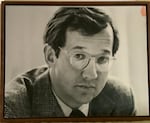Henry Richmond, whose lobbying and legal pressure shaped Oregon’s land-use system, has died at 78.
Richmond died suddenly on June 21 at his family’s farm near Newberg following a heart attack, according to his son, Christian Richmond.
Richmond formally launched 1000 Friends of Oregon along with outgoing Gov. Tom McCall in 1975 to protect and toughen the statewide land use program adopted by the Oregon Legislature in 1973. His group lobbied regulators and filed scores of lawsuits to put teeth into a system aimed at stopping unchecked urban sprawl.
Richmond his group “were a very important part of the evolution of the system in the early years,” said Sy Adler, author of the book “Oregon Plans” about the state’s land-use system.

Henry Richmond. It was taken in 1978 and provided by his family.
Courtesy of Henry Richmond's family
Adler, who is also interim dean of the College of Urban Studies and Planning at Portland State University, added that “in important ways, they were inventing law” as the system took shape.
Richmond himself showed his trademark tenacity when he boiled down his years of work at 1000 Friends – which he led for 19 years – in a 2015 oral history with Adler.
“It was a hard-fought deal,” Richmond said. “It wasn’t a lot of cooperation and yackety-yak. It was a bloodbath.”
Richmond helped fend off ballot initiatives in 1976, 1978 and 1982 that were aimed at watering down the system. The last came as the state was in a deep recession and McCall, facing terminal cancer, pleaded with voters to save one of his major legacies.
Oregon’s land-use system was created amid a burgeoning environmental movement championed at the time by both Democratic and Republican politicians. Oregon enacted what became some of the most sweeping laws in the country, in large part because the state’s rapid population growth was causing a major loss of farmland in the Willamette Valley. The new program led to urban growth boundaries around the state’s cities and curbs on residential development in rural areas.
Richmond first got involved in the land-use debate through the Oregon Student Public Interest Research Group. As McCall approached the end of his two terms in office, Richmond urged him to join in forming a new organization, 1000 Friends.
From the start, Richmond made it clear that he didn’t want 1000 Friends to become another environmental group. Instead, he said it should be focused on managing growth. His father had once been administrator of the Bonneville Power Administration, and Richmond was adept at building bridges with the business and civic community.
For example, he recruited Glenn Jackson, a utility CEO and state transportation chairman who was the state’s most influential power broker, to serve on the advisory board of 1000 Friends.
As the newly formed Land Conservation and Development Commission developed goals for the fledgling system, Richmond’s group was quick to challenge counties and cities that were unwilling to surrender their authority.
“There was always some lawyer working for the local governments [who] would try to write the law, interpret the law into mush or out of existence,” Richmond said in a 2020 interview with OPB. “And we had to be on the other side to say, ‘Wait a minute.’”
“One Thousand Friends was really the game in town back then bringing all that litigation,” Dave Hunnicutt, president of the Oregon Property Owners Association, said in a recent interview. Hunnicutt’s group, formerly known as Oregonians in Action, later became a strong political force.
Richmond “was always big on doing something of substance,” Christian Richmond said, “doing something that was consequential either in the community around you or something that needed to be saved. And in his case, it was Oregon farmland.”
At the same time, Richmond also focused 1000 Friends on promoting denser development within urban areas as he argued that the state couldn’t protect farm and forest lands if it didn’t do so.
Richmond is survived by his wife, Ruth Bryson Richmond, and by two sons, Easton and Christian. They plan to hold a memorial service in late summer.
Listen to Jeff Mapes discussing Henry Richmond’s legacy with OPB’s John Notarianni using the audio player above